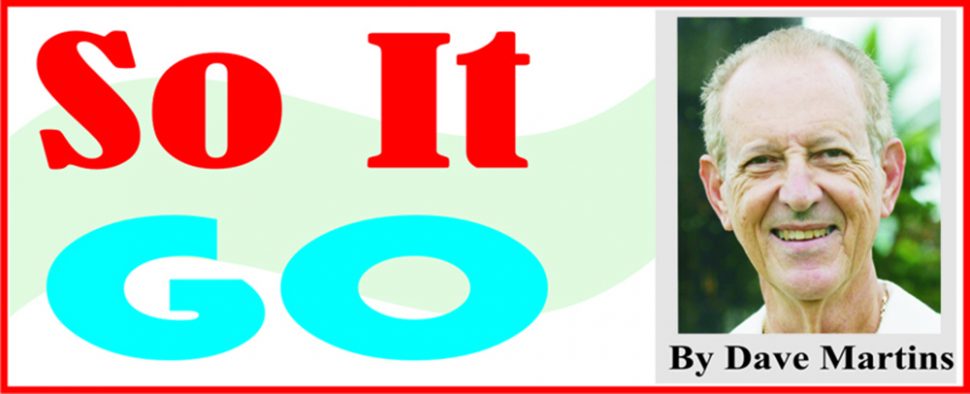It occurred to me recently, after a long, rambling conversation with a young musician hopeful, that unless one has gone down that road, you have no idea of how very difficult, I would even say daunting, that path is. There is no formula anywhere, no how-to-book on the process, partly because every musical journey is distinct and unique with the traumas and pitfalls that obtain only from that person’s set of circumstances or abilities. The path that Sparrow took in his emergence, for instance, when I hear him talk about them, are completely different from my own; my going to him or to Dennis DeSouza in Trinidad, who I got to know in the years after Tradewinds became popular, for advice on how to proceed with this problem or that, would have been no use because their obstacles or advantages were nothing whatsoever like my own. The potential popular artist is wrestling with something very nebulous, and in each case the individual must find his/her own strength and own impediments and learn by doing how to successfully manipulate those things. It is unknown territory, because the details differ widely from case to case, and behind every successful musician story I know there are very particular things pertaining usually only to that individual.
For example. When I launched Tradewinds in Toronto in 1966, having had two bands before that, I did so with the knowledge that Caribbean travel for the group would be mandatory because while there was a Caribbean population of immigrants in North America, the holy mecca for that music would be the countries from which those people came – Trinidad, Barbados, Jamaica, Guyana, etc – and that everything about the band’s success would rest on Tradewinds becoming popular in the entertainment venues of those countries. From that fundamental fact I was aware, for example, that in those years, the 1960s, a band touring the Caribbean, particularly at Carnival or Festival time, would have to travel with their own musical equipment as the local supply was already taken up by the resident bands. I look back on it now with amazement, because this meant when Tradewinds left Toronto on a Caribbean tour we were travelling with 27 pieces of musical baggage – speakers, amplifiers, wiring connections, microphones and the various cables for them, in addition to our suitcase of clothing and shoes. Having to play in a variety of venues where technical facilities varied widely, we even had to travel with various kinds of plugs and adapters for our equipment which were not always available in the open-air venues across the region – three-pin electrical plugs, for instance. Looking back on it later, it was close to an impossible undertaking starting with the very offloading of the 27 pieces in each country we came to. I recall vividly having to sit and wait at Timheri for almost an hour, and for the ordinary passenger luggage to be offloaded, before the airline would get to our equipment. I came to see it as a kind of craziness, but an unavoidable one if a band wanted to do a tour. Later on, companies sprang up in those countries providing such equipment for rent, but in the early days that did not exist; you brought your own gear; case closed. Also, of course, we were coming to these countries, as we say in Guyana, “with we two long hands”. We had a residence only in our country of origin; for the other places it was hotel, rent-a-car, restaurant, a whole slew of living arrangements to be made. Just to move the five musicians about, day to day, was a hassle, including set up, sound check, performance, breakdown, media sessions, etc.
In my homeland, Guyana, I had friends to help provide those connections, as the other guys did on their own turf, but we were usually doing five stops on each tour, so in four of them we were basically on improv. I was to look back on those times and wonder how that melee did not unravel from day one; in the days when there were no engagements, being adrift like that was, for me, like being in jail 24 hours a day.
Beyond all else, however, I concede that this “life on the road” was not my cup of tea. The constant packing up and unpacking, the hectic day times of set up and sound check, the often raucous hotel environment after the gigs, with parties going on into the wee hours, was quite a load for a small village country boy like me not used to that way of life. I saw the need for us to do these tours for people who couldn’t come to the music, so we had to take the music to them, but the mechanics of the thing was onerous for Dave Martins and I suspect for Kelvin Ceballo, our Trini drummer, as well. I could never understand the American country singer Willie Nelson eulogizing that way of life in his song On the road again. I used to enjoy Tradewinds coming to Guyana where I could spend a few days with my aunts at Hague, even sleep a couple nights there, link up with people I knew as a youngster, but being on the road didn’t do for me what it did for Mr. Nelson. On those music tours, I was always looking forward to the day when we’d be getting on the plane taking us back to Toronto; me and the Trini drummer. “On the road” was not where I wanted to be, but to make it in the music business it is a totally necessary journey









